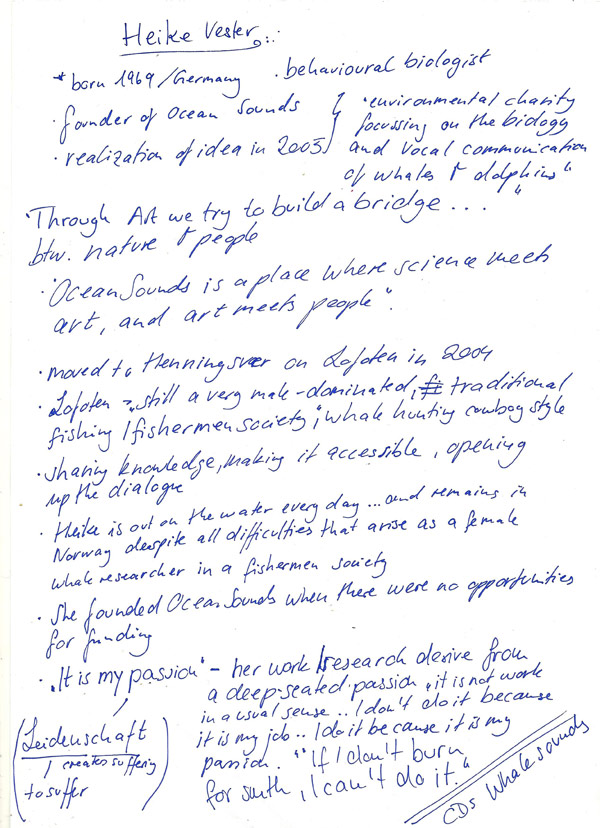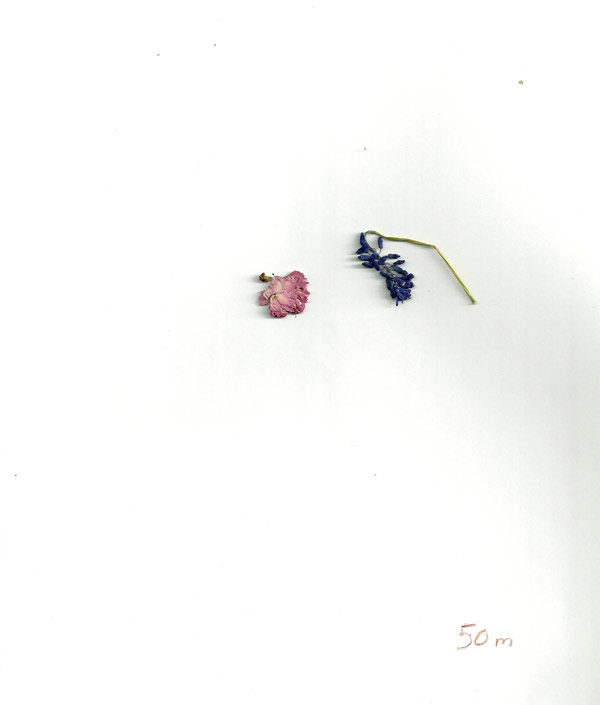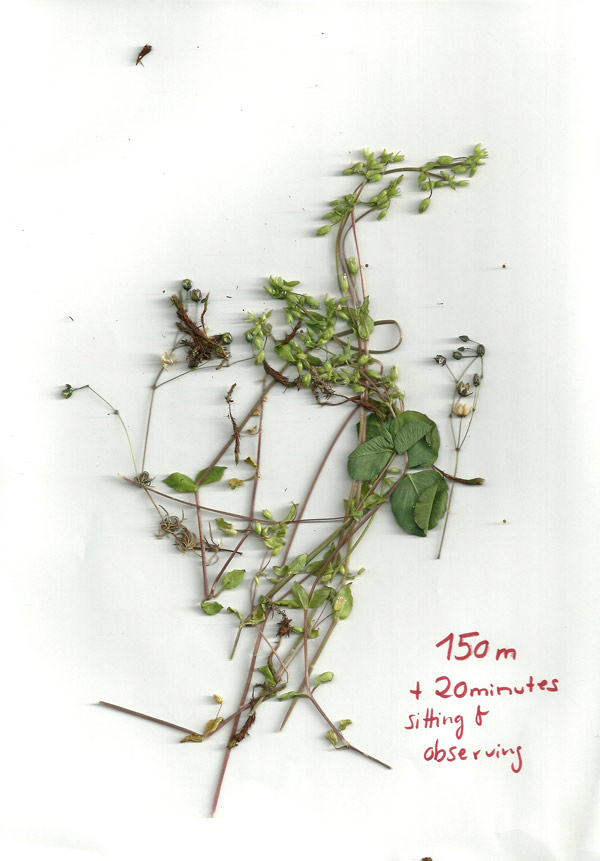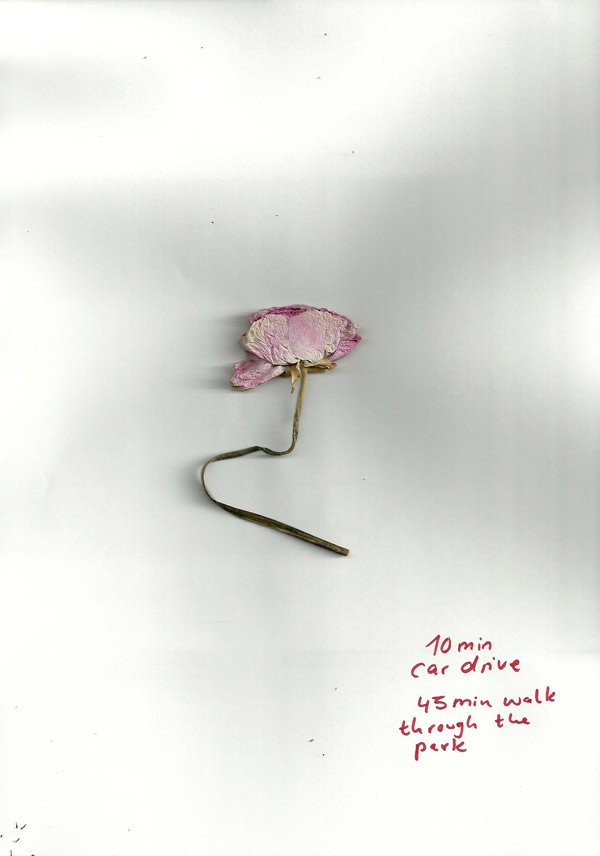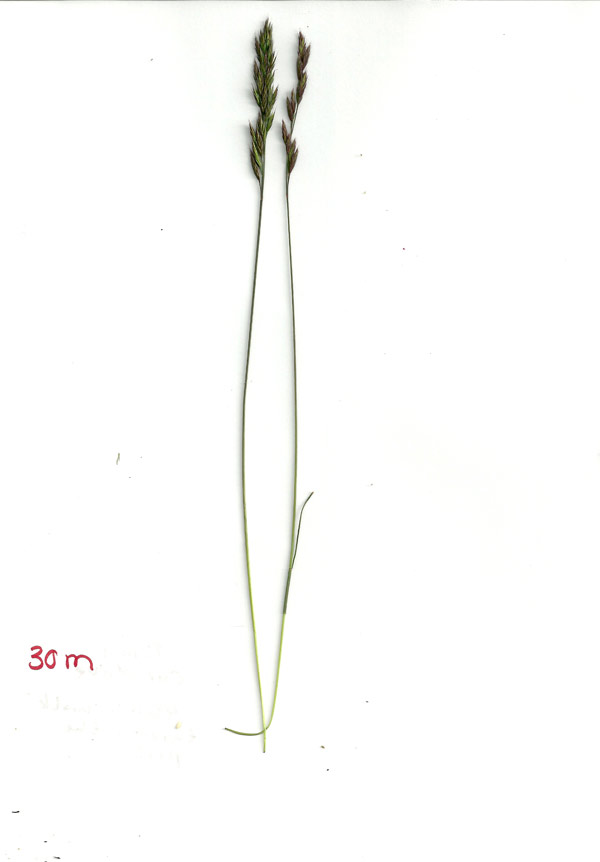Cave Painting II


“inequality is evoked but not insisted upon: the contradictions between conservative and liberal explanations of crime, arising from the need to surround (‘humanise’) a single criminal act in terms both of social disadvantage and moral lapse, can only be resolved in fatalism, the inability to escape from destiny.”
“in most episodes, the explanation for a rampant drug problem hovers uncertainly between a generalized inner weakness on the part of individuals and external, sociological factors (the black ghetto, the ‘soft’ treatment of juvenile delinquents) before scuttling the dilemma altogether in sheer fatalism.”
“the use of poignant musical coloring transfixes [emotional] poses into a pervasive fatalism, a world resigned, buffeted by uncontrollable events.”


Reynaud Cage Jr., 48 and Yancy Cage, 39; April 3, 2010
cibachrome, ink, 41,5 x 34 cm
From LA Homicide, 2010
LA Homicide, Ellen de Bruijne Projects, Amsterdam, September 4, 2010. Camera by Erik Smith
The Opposite of Fatalism – Knee Play, Jeremiah Day / Simone Forti / Fred Dewey, from Nonfictions, May 1 & 3, 2014, Santa Monica Museum of Art. Camera by Naotaka Hiro
An American friend describes a family holiday to Disneyland in the late fifties. Walking along holding his mother’s hand, he gazes upwards at the brightly coloured wonder around him. As his eyes fell he saw a side door bounce open on its latch. In the small room now visible, Goofy stood partially disrobed. The character’s orange and blue suit gaping open at the back reveals a perspiring actor taking his break and breathing deeply. The surrounding room was sparse – ordinary clothes slumped on the backs of perfunctory furniture, locker-room rubbish scattered on the floor. Goofy’s eyes met his and the door, in its return momentum, swung closed.
Linda (Kim Novak), rehearses My Funny Valentine on a nightclub stage in the 1957 film Pal Joey. An orchestra begins to play, the curtain opens and Linda walks forward into the spotlight to stand behind a large, frilled, pink, satin heart. Linda is a chorus girl and this number will be her first at the club that won’t involve removing her clothes. The film is in soft focus. She sings the opening lines and the camera pans behind her. Joey (Frank Sinatra), sitting in the audience is now visible over Linda’s shoulder. He’s watching her intently. The padded heart is also now seen from behind. The structure is crudely nailed together, the pink satin clipped and stretched around a wooden base itself strapped together from mismatched wood. The heart moves as Linda gently leans against it.
In 1984, magician Tommy Cooper performs his act to a full house on the stage of the Her Majesty’s theatre, London. He’s helped by an assistant who hands him the objects he uses as props for his routine. He’s a comic who masterfully fluffs his delivery, gets his tricks wrong but makes his audience laugh, willing him on to get at least something right. As Cooper puts on his magic cape he falters and leans back on the house curtain. He falls lower and lower until he’s sitting, then lying on the stage, his top half obscured by the heavy drapes. Half on stage, half off. He makes gurgling noises. The audience continue to laugh. London Weekend Television cuts to an advert and comedian – Jimmy Tarbuck steps out and begins a 3-minute set. While Tarbuck performs, the remainder of Cooper’s body is pulled back behind the curtain.
Nancy Reagan is being interviewed by a television journalist at home in the late sixties. They are discussing what, as the wife of California’s governor, she’d usually be doing at that moment so that they might film her candidly during the interview. While they decide on cutting some flowers in the garden the writer Joan Didion makes notes on the mornings events for her own essay. Reagan and the interviewer head outside followed by the cameraman. Didion joins them. Preparing to rehearse their first question and answer, the interviewer asks Reagan to nip the buds off the flowers as she replies. The cameraman suggests that while they rehearse Reagan should only ‘Fake the nip’. Didion watches Reagan as she plays at cutting the flowers and the cameraman lines up his shot. Didion includes the moment in her essay ‘Good Citizens’, later published in her book The White Album in 1979.
Ilsa Colsell is an artist and writer. Having grown up in Orkney, Scotland, she now lives and works in London. Her physical and written works navigate amongst the layers of death and collage.
She is the author of Malicious Damage: The Defaced Library Books of Kenneth Halliwell and Joe Orton (London: Donlon Books, 2013).
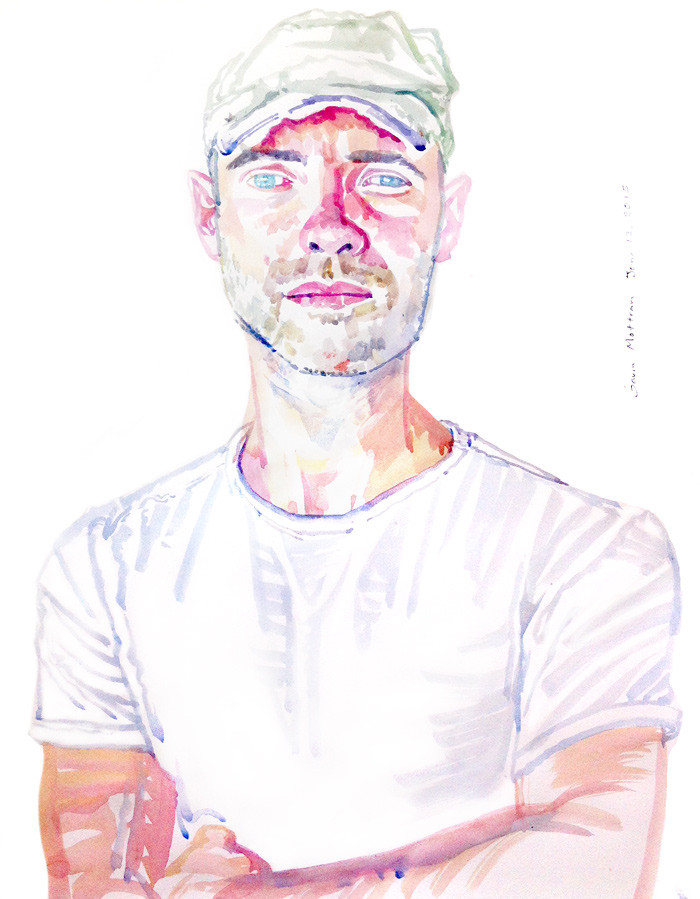
Don Bachardy was born in Los Angeles in 1934. He Studied at the Chouinard Art Institute, in Los Angeles, and the Slade School of Fine Art, in London. His first solo exhibition was held in October 1961 at the Redfern Gallery in London. He has since had many solo exhibitions, including in Los Angeles, San Francisco, Seattle, Houston and New York. His works reside in the permanent collections of many art institutions around the US and abroad, and there have been six books of his work published.
For my instalment of Out of Focus I asked writer and artist Aimee Campbell to re-imagine Willa Cather’s short story Paul’s Case. Originally set in Pittsburgh and New York, Aimee has transposed the location, characters and vernacular to Glasgow and London. I recorded the result as a form of radio play, reversing the narrative and collaging additional sounds, voices and images for it.
I invited the Santa Monica-based artist Don Bachardy, my art contributor, to create a cover for the play, and I would like to thank Gavin Mottram for sitting for the painting. My non-art contributor, writer Ilsa Colsell, was invited to produce a text on the art of the reveal.
syncing sing sling7
sneeze sne snild meer
mis’sing mis’sync
lovelovelove
cinto amigo
ciego cien
si llego gota
muy bien viene
te amo laughing
speak, be, me, feel
sweet, skip, squeak,
blood, love, glove,
busy. Google hello
by sing Sweden
swim sweep me
lovin sync
pepe bajos
sí sí sí
tu sí two c
mi mi mi
hurry-up 10
to me tomorrow
mi mi mi
tu mi bajos,
pam pam pam
un día mia dí
“umpa look at that”
subir subir…
vi vi-vir, pedalea
sweet click-meat
meet, la’vie
soon beat
The starting point for ooga booga bongo music was our interest in sounds that are on the border between speech and music. We recorded eight tracks composed of short syllables and vocal fragments and asked people to transcribe words or phrases that they heard in the sounds. The results are collaged poems of imagined/overheard things: lyrics of sorts.
For some of the sounds, listeners described colors in addition to verbal language, for example ‘clear, lagoonish blue, but with red-brownish borders, like a rusty crust shooting up from the lower left to the upper right’, or ‘an uneven, cloudy but very saturated pink with patches of bright green, like lumps of swamp algae.’
An ongoing collaboration between Los Angeles-based artists Sarah Rara and Luke Fischbeck, Lucky Dragons research forms of participation, dissent, perception and attention in performance and public art, purposefully working towards a better understanding of existing ecologies through workshops, publications and recordings.
Inspired by Hélène Cixous’s writing, Emely Neu invited Cixous to contribute to her instalment of Out of Focus. Cixous’s response is a collage of her texts about her mother.
(A) Eve
–Lenau? says my mother, I think he’s the one who departed for America. All the poets think they have to leave. Leave, people have no idea what that means, no no no no. Yes. In German one can’t partir. Only in French. Another one who died young. Poor fellow. Poets die young. –Flaubert, I say, guess how old he was when he died? Flo-bear? I didn’t know he was dead. –Fifty-nine, I say. He was a giant. –No! Really? Did that bother him? –What bothered him was the writing, I say. He lived bothered by it. –He drank a lot, maybe? –Not especially. My mother is downcast. Here they are all around us, the poets who die young, poor fellows, they prove my mother to be right. –Stendhal died at fifty-two, I say. –Stendhal, never knew him. Has he been dead for a while? And his father let him die of hunger, says my mother. –It’s possible, I say. I sense that my mother’s antennae are different from ours. –And Kafka? –He was born at the same time as Omi. –Did Kafka die young? –Forty-one. –Incredible! So soon! He didn’t get on with his father. His father wasn’t nice to him. All these men their fathers let die of hunger. And Balzac? Older maybe? my mother hopes. –Fifty-one, I say. –Impossible! He didn’t have enough to eat! Him too. What’s to be done? –Should I continue? I fret. –Joyce, says my mother, died at a ripe old age perhaps? Yet another hope shown to the door. He too died young? Baudelaire –here it’s as expected: I think he died young. He’s the one who went off into the desert. –Yeees, I say. –Not very encouraging, is it? says my mother.
(B) Hélène
Beginning today, I thought, October 15, 2005, Mama enters into the unknown: no inhabitant of her story has pushed beyond ninety-five years. Here her mother stopped, Omi my grandmother, I thought, it was a difficult stopping, ill-fortuned, an example of waste, a poorly done ending after a race so well run, to falter at the last hurdle, that causes a profound feeling of injustice, and one doesn’t have the right to a second try, the way Omi failed the exit exam, I prefer not to think about it, I don’t know how far my mother pushes her thought, we don’t talk about, we don’t think about it.
After October 15, 2005, my mother entered into posterity, she advanced very far into virgin continents, like an emperor destined to be alone far in advance of an army of broken-down soldiers, of die-too-soons and unfortunates.
From here on I have three fears for her and therefore for me. I fear the guilt of the survivor. And what if she began suddenly to attack herself, to wonder what she’s doing there, when everyone else has left, if she were stung by an uncertainty, one sees the characters of the play fall one after the other, above all one must not think: why not me? It’s very difficult. The period in which everyone leaves is like a plague. One wonders every day if one is not going to catch death. It’s a deceptive, treacherous idea. To each his or her fate. There is no reason to do the same thing as everyone else.
I fear that she will be persecuted by the Feeling of Solitude. It’s the kind of melancholy that darkens the heart of the great precursors.
(A) Eve
–There was nobody but Jeanne around says Éri.
–The ladies get up late says Ève.
–In the Manchester home we are up and about after breakfast. Éri barks at death. Upright on the banks of Lethe.
–Let me tell you something: those people were in another room we didn’t see. My mother on the other bank
–If there is a room, das Kann mal wohl sehen. The room we didn’t see, in vain Éri repeats her complaint
–We didn’t ask where it was
–I saw two who were all alone in a wheel chair. The man was spinning the wheels, feet dragging on the ground –Oh horrible! Oh horrible! Most horrible!
–A huge orchard, lots of trees
–Those primitive chairs! What falling off!
–Then we went out for Chinese food
–Oh there was much too much to eat!
–We were the last customers
‒I ate some turbot, says my mother. She remembers the turbot with fondness. I see the turbot now in her eyes. She still sees this turbot.
‒Really beautiful the turbot, says my mother. That the turbot is beautiful is an appreciable plus. And you? I had a turbot: something.
And me too. I receive the beautiful turbot something. She eats for me. I eat her.
‒I am replacing, says my mother.
That too I carry to my soul’s mouth, but I don’t know exactly what taste “I am replacing” has.
‒I am lucky to be still-here. So much the better if one is lucky. One doesn’t choose one’s lot.
Her lot: being-still-here. The lot has a natural logic.
‒I am replacing those who have left early. I am replacing my father, I am replacing my husband. And you? What did you eat?
‒Some of you. Of your turbot. Some chicken of you.
I can’t contemplate you without pulling off leg or breast.
‒My presence is a habit, says my mother. She sucks on a piece of chocolate. But one never gets habituated to habit.
How much time still? For how much time? How many more times?
(B) Hélène
I could see perfectly well what it wanted to say, but I kept it at arm’s length. I bolted upstairs to my bibliomortgaged life, into this retreat guarded by several lines of very powerful books, where my mental health is less directly exposed to the pressures of the imminences. I bolted. In the world-other, there are exits and escape hatches, and good hideouts everywhere. And there, I tell myself, by definition, no disappearance, just the opposite. Upstairs appearance is everything. Literature knows nothing but appearance.
The powers of the ruin enchant me. I am in the state of passion of the Great Dreamers that my uncle Freud talks about, who having been nourished their whole lives at the breasts of Dream see themselves brutally weaned. One can find no greater cruelty than this surgery operated on the very lips that stretch out blindly toward the expected spurt of milk, as if some Evil wanted to withdraw Life at the living spring. It is an uprooting of light, the Dream is ripped from the brain with pincers. The tortured one is granted the bitter chance of powerlessness. He is left the ruins to chew over. For nothing in the world would the Weaned Dreamer give up this pale pain. You can believe me: I know all about this. There was a world in this tower, there was a Book in this head, of this immense Earth, I am left with two verses. I live on the milk of mourning. Eyes empty, vertebrae rusty, the bony sequestration of a humanity who was Montaigne’s unknown lady friend, that is what serves me as the sun in the dungeon, the great open eye that I think I see contemplate the enchanted reader in his library, and scatter on the pages from which he makes his honey its inexhaustible golden beam.
The winds are the violent lords of Theory, says my friend. During the entire time of Theory, they blow, they blow imagination-roiling storms, trees bow to the earth, the roofs over family homes are blown away like the pages of notebooks, countries come out of this scalded by heat waves and are plunged into ironic yellow floodwaters teeming with the cadavers of calves and goats, sometimes they throw themselves down for one afternoon on the ravishing slopes of a meadow they doze off, they groom themselves like lions purring over their victims, giving mortals time to catch their breath and undergo fresh tortures. There in few words you have the ferocious laws of Theory. Theory is this sort of Weather. Horrible all the time with a clearing or two now and then so you can recharge your anxieties.
(A) Eve
The battle occurred on December 25, 2006, between Hanukkah, that is, my mother and the lights, on the one hand, and on the other the Law, monstrously crazy in my view, that avariciously cycles life. We light the first candles. This scene is a landmine. All by itself it’s a scene that hides another scene. Let’s say that the hiding is reciprocal. When my mother celebrates Hanukkah, she feasts and feigns at the same time, honestly with subtlety, for my mother doesn’t believe, but she finds a charm in the belief she does not have, what remains of religion is the ambiance she says, she is glad to hold on to the ambiance, to the word as well, especially the word, the words. It’s the same for Hanukkah, the charm, the words, the lights, the story, every year she forgets it, therefore I can tell her again, she never throws out a thing that might make life more agreeable the envelopes, the containers, the jars, the lids, the skin, the body. Last December 25, a day of bottomless sorrow I was thinking, everyone leaves, my good friends, the woman, the man, Éri, life emptying itself out life empty, I ask mama: have you never lost the courage to live? Knowing that she has never lost anything if I ask the question it’s because I am curious about the form the answer will take. And the response snaps back, naked, clear, tranquil as mama’s soul: Never. She’s reading The Blue Notebook. She’s reading The Book of Common Prayer. Deciphers the first page. Same concentration. Devotion, the same. It’s a matter of giving life to the book. The Voice comes from the bottom of time: studious. Lesson. The language is the same: in both cases it is Hebrew. The difference is the book. The Blue Notebook clean large practical, one can add pages. The Book of Common Prayer looks like a dust mote. Mama. Pretty gentle disciplined head. Her pink sweater. So thin. Thinner and thinner. I track the dwindling. How far how long. When her voice quavers a column of figures firms it up. She communicates to me injects transfuses transmits what is called: Contents. The word Contents. These begin by “In case of Death.” My mother pronounces in case of death. The word death imparts a little phonic satisfaction. I don’t watch, I don’t listen. Mama reads. She stops. Here a figure is missing. She completes a line her finger underlines: lot number 5. She writes with application. Like she prays. The secret is in the application. Slowly I slip into an anesthetic drowse. The candles go down slowly too. A yelp: where’s my will? I hear from under the anesthesia. We can’t be there. Ha! Here it is. The page of the notebook is folded over and taped to the inside cover of The Blue Notebook. Mama wets her finger, unfolds. Mywill.
B) Hélène
I made no comment upon the figure of the Squirrel, everywhere living in my books, ever since Squirrel The First, the half-squirrel, whose spirit haunts Tomb (where I laid it) or rather over which Tomb, the book, has kept watch, as you prefer, for decades. How everything began to transform itself starting with and because of a Squirrel in Washington Square, my life in an instant turning into literature, without my being aware of it, that October morning in 1964. I thought it dead. Right afterwards, a bound … resurrection. Then from death to resurrection, from book to book, from literature into reality, I have never inaugurated a notebook without a wave from one squirrel to another, and so on. Later it turns up in the shape of Goya’s half-dog. Forever more alive than dead or rather: rather than dead forever still living. But one day, when my brother calls me on the phone, telling me: “Sit down,” I realize that, this time, “it” is really dead. My brother found it dead on my bed. When I beg my brother: Bury it, he doesn’t say no.
‒Swear, swear I say, swear. I should stop there. And for the first time it was done.
‒Sit down, says the voice of my brother, meaning: “so you don’t fall down.” I’ve never spoken of the Squirrel to him. He has never read Tomb. Had he read it, this would not have unlocked the secret. Not even I knew the underground geography of the Squirrel kingdom.
Among my revenants the Squirrel is the most literarily revenant, the most literary of my revenants. I could hardly tell my brother, there you bury my most ancient god, my religion, the most forsaken of my prophets, last of the Mohicans, Incarnation of Literature’s Genius, Fate’s Gambler, outwitter of verdicts, in that little hole you bury several continents and four tombs, it’s The City you bury, Comeback City, first and the last cradle, you bury the adorable error of the truth, from this day forth there will be no more Resurrections in Reality henceforth they resuscitate in the dream world.
We are sleeping. During our sleep the Squirrel is removed from us, not the way they remove one of our ribs to raise it up beside us, but the way a butcher cuts out our lung. Upon waking one looks for it everywhere, for a long time, weeks, one drags around with this enormous wound, and naturally it is a widowhood without consolation. We cultivated this cavity. No burial, never! We don’t renounce our heart, we don’t replace our lung. We keep the Squirrel, internally. We don’t understand this act of aggression, it would be a weakness to understand it, we keep the silence of the faithful about this abduction. We do not forget.
A) Eve
‒Mama! I say. ‒I’m-drinking-my-coffee! says my mother. That means: I’m just dandy. She says I’mdrinkingmycoffee with a triumphantly tender smile, it’s a love letter. I receive it. One day I’ll write the book of utterances signed mama, I tell myself, complete with translation, an inventory of their secret usages, and above all indications as to the intonations, all this subtle and singular linguistics that makes my mother’s speech a very powerful and original composition underneath its modest dress. This will be difficult, somewhere between onomatopoeia and epic, maybe we’ll call it happ, Happ as in Hoo! As in Ève! showing the surprise the pounce of the happnimal upon life, or the sudden dive through the paws of death. Happ! there she goes! That sudden brutal movement of a pounce, that one also finds in the Germanic languages. ‒Happ! what do you think of happ? I say. Mama laps up her coffee. –Happ? It’s half of happy. Only dogs hapse like that. Me, I lapse! She chuckles into her coffee.
Beginning in this month of July my brother and I sing songs to my mother. This was new.
Voices. This had begun as soon as we arrived at the abode, I was still in the cats’ garden. The first time I thought it was my brother. Above my head, in the wisteria to the left. A resonant voice singing to Eve:
‒You-don’t-want-to-eat-a-hardboiled-egg?
‒No.
‒You’re wrong. You will never find it again.
(Sound of an overturned cup)
Resonant voice: Ooooh! What a messy pig!
Cicada’s voice: But-where-is-the-rag-for-the-pigs?
Resonant voice: It-was-a-poor-little-rag-that-I-threw-in-the-ga-arbage!
Cicada’s cry: What! Thown away! woe is me! my rag!
I kept that rag for years!
Resonant voice: We’ll go to the supermarket to find a rag
To deal with all of the pigs oooh!
My mother chirped a little laugh.
B) Hélène
But for the dreamer of literature, what’s intolerable about this activity, which is inactive, about this job that is not a job, about this waiting for something to come along that is dependent on visions as a sailboat on winds, is that one can’t keep oneself going without the assurance of total solitude, whereas solitude is devastating, one lives on what is deathly, worse still, one lives on what deviates from life, one cannot speak wholeheartedly except to the dead, which I do, or to some of those among the living who are just as invisible and as unavailable as the dead, which I do.
Sometimes one goes mad, breaks into a gallop, tears off one’s clothes, pushes back one’s chair just when everyone is sitting down together at the table, one takes to the road, which is so empty one ought to be suspicious, a few meters on they set us down in front of an immaculately white, high wooden gate that should in itself be a warning, the person on duty opens it a crack, curiosity gets the better of us, and leads us beyond the few thoughts that might restrain us, might remind us that dinner is on the table, one enters and one is amazed to discover a veritable counter-city, a whole neighborhood of lovely white buildings, small in size, to our left are houses in the style of miniature Greek temples with colonnades, everything is closed up tight and seems to be asleep, it is elegant and calm (writing this I sense it is the land of the dead and I don’t know it).
We are animals who set down their last words. When the animal defender of life within us feels the ultimate cold coming, in which the other, the speaker within us, is careful not to believe, quick the animal deposits a stone, a word, an egg shell, a twig, a letter of a letter. One engraves. One scribbles. One digs holes. The end comes. –Quick! Mama! I cry. A letter! –Which one? –Come on, I prompt. –V. says my mother. Or is it “Weh”?
A) Eve & B) Hélène
And the asparagus?
Chapter one of Twists and Turns would be: “Mama’s Asparagus.” I could already picture it. Mama is installed in her chair, facing Manet’s Asparagus. She is presented with the asparagus as it has emerged from art, before the first representation, naked, unbound, nameless, without signature, without explanation. I wanted to return with my mother to “the origin” of the work of art, that is to say, to the secret spring in which reality bathes so as to emerge streaming with spiritual light. Not the asparagus, but the thing that precedes it.
My mother in front of the asparagus. My mother seated. The asparagus reclining. In the background a ripple of sandy hues, day dawns. One is not sure what exactly. The asparagus points toward my mother. One is nature, the other extremely clothed. In the scene, my mother will be carried away by curiosity, uncertainty, disgust, perplexity. This mixture gives rise to a flow of words that hop and skip about as if to an absurd tune by Satie. A spontaneous, natural pastiche. The spectators, if one has been careful not to name the a(sparagus), will be just as mystified but less pure than my mother. The extraordinary charm of the object a and its enigmatic force are snuffed out the second one pins the butterfly down and nails the thing to the wall.
Let’s preserve the impromptu. What is so delightful about an impromptu is the actor’s innocence. It is always the first morning of the world. One must enter the scene without opinions, without prejudices, without knowledge, without ideas, with the passionate ignorance of a little child, so as to find oneself at the origin of the marvelous. One encounters. Then everything emerges for the first time. It is thanks to this inaugural consent that we’ll have been able to see the narrator’s Françoise pluck the asparagus just as the Felicity of “A Simple Heart” will have been borne heavenward by the sapphire-blue plumage of her parrot. The painter too sees the asparagus’ feathers. Naturally, in the beginning of the world, things are still free, names haven’t yet hobbled their movements. They are not classified, put into groups, packaged in a concept of species or race, not bundled, not tied up or choked off, they still have their wings, their feet and their breath, they spring, they gurgle bright sounds, they asperge, they grow bigger, all the while bubbling with laughter.
My mother (wearing a shawl in shades of beige and grey, tinged with ochre, tip of her nose poking like a beak from beneath a beige cap’s visor, which gives her a bird’s head, for a long time studies the inert reclining asparagus, its head turned toward the head of my mother). ‒What sort of beast have we here? Is it an animal? But it’s ‒ a fish! A fish? (She looks from me to “the fish”) But yes! You might think. (She points.) Here,a big mouth. Why is the mouth open? (The asparagus holds still, teeth out of sight.) It’s bizarre. I don’t get it. Yes? No? Is it a hand? It’s so long! It’s a mystery. A bird? (She looks at me. She removes her glasses.) Without my glasses I see a sort of muzzle. But I don’t understand what of! I don’t know what it’s doing here. (Looks.) Is not beautiful. Yes? Beautiful? No. Don’t understand it at all. But there, there are three fingers. No! It is not beautiful. But ‒ is it a fish? (I burst out laughing. This thing is the undecidable itself, laid ‒ on what? My mother tries to decide, scanning the sheet of paper, on which the asparagus has been reproduced, suspiciously.) Laid? As you like! But darned if I know what it’s doing there on the ground? Poor thing! And that, this, background that one doesn’t know what it is, sky, earth, and over there the poor thing with its mouth open. (She prefers to look at the magnolia. Comes back to the thing.) I don’t know if that’s the tail. (She looks up at me, quizzes me. I don’t answer. The asparagus pricks up its head.) Is it lifting its head? You aren’t going to tell me that’s a somebody lying there! You don’t mean to say it’s a bird? Now I see a beak. But with gigantic feathers. A bird amazed by the length of its train. I’ve never seen such a bird. So maybe a fish. It could be a man’s head! But how? He was swallowed by the fish? But how could he get inside the fish? So this fish ate a man? Who poked out his head? Not a pleasant thought! It scares me! I see a fish and it ate a man starting with the feet, that’s all. I have no idea how he did it! Do you get it? –Yes, I say. Differently. –Differently? My mother is indignant. I see the fish that swallowed the fellow. His head sticking out. But what’s this story all about? He saved his head, but the rest, forget it! –What about the colors? I say.
My mother refuses to answer. So I show her A Bunch of Asparagus, copied from a reproduction.
Me. –How about this? –That, my mother says, is a bunch of asparagus! Me. –It’s a painting. My mother. –A painting? What do you expect me to do with that? Can you peel them? No. They look real enough. Is that something old? It is a bunch of asparagus. Fine. Who’d ever want such a picture? I am not the least bit interested. It’s well done. But can you eat it? Me. –You wouldn’t like to have this painting in your house? My mother. –You can say that again! Why would I put asparagus on the wall? That’s kitchen stuff.
Now I show her the Asparagus again. Will she grasp the relationship between the one and the many? My mother has advanced in her research:
My mother. –Aha! This one is coming out of the shark. Interesting: this one was eaten by this shark. But it is coming out. It looks as if the fish is giving birth. To a man. –It’s a shark? –Well, it’s not a sole, that’s for sure. It’s a shark, to be so big. It gives me the creeps. The shark swallowed the man but not completely. You always have pictures with people getting swallowed. –There’s a name, under the picture, I say. (My mother reads:) The Asparagus. There’s a shark in the asparagus. I don’t know anything about sea asparagus! Still, it’s on land. You’re going to spoil my appetite! Me. –I’ll tell you a secret. (I tell her the secret.) My mother. –Manet? An asparagus stalk, you say! Me.
Sitting on an infinitized table, a table earth, sea, sky, but still a table. What is troubling, that is to say beautiful, is the variety in the unity. The effacing of all demarcations, I say. A table that stretches into sky, an asparagus-lizard that climbs onto the table, half on the table half on a swath of color, askew, ready to fall off. Plus the asparagus is lifting its head. It’s not an asparagus stalk, it’s a penis lying there twitching its nose. It’s not that. It’s an iguana. But it’s not that. I tell myself. This thing-being, undeniably animated, which veers from one genre to another species, this crocodile, this bird, this half-eaten, half-saved thing, this head that pokes from a ground undecidably sand, this ear of wheat which shades insensibly down to the foot, or conversely that straightens right up to the crown, stayed with me all summer. The day of my arrival in the house I posted it on the section of wall that becomes my painting gallery when I write. I’d obeyed without argument a strong feeling of admiration. This thing could be anything and everything, in turn, could be a tower lying on its side and – And – the ghostly, unexpected and compelling figure of the image, the one and only one, from which I am never separated when I go off on an expedition, for it is for me the Incarnation of the Triumph of Life over Death thanks to art’s sleights of hand. What does art do when it paints a story? Art goes down to muck about in hell to bring a dead person to life. The unique magic image is the presence, in the same dimensions as the original of the Dog Goya recalled from hell, which lifts its head from the subterranean nothingness, and which is us crushed between the teeth of infinities but alive, a little hazelnut, its hopeful snout in the jaws of Time. The dog with its asparagus head, I was thinking.
Collage of excerpts from Hélène Cixous’s books Hemlock: Old Women in Bloom (transl. Beverley Bie Brahic, Cambridge, UK and Malden, MA: Polity, 2011), Eve Escapes. Ruins and Life (transl. Peggy Kamuf, Cambridge, UK and Malden, MA: Polity, 2012) and Twists and Turns in the Heart’s Antarctic (transl. Beverley Bie Brahic, Cambridge, UK and Malden, MA: Polity, 2013). Assembled by Marta Segarra.
